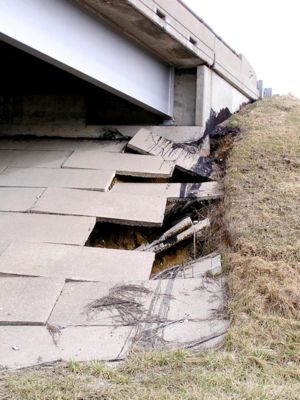611.3 Concrete Slope Protection
611.3.1 Design
In urban areas, the project core team may decide that concrete slope protection is appropriate for specific aesthetic reasons, as an alternative to rock blanket, under the ends of grade separation structures. Concrete slope protection may be used at other locations where necessary to prevent slope erosion. Concrete slope protection is constructed with a 4 in. (100 mm) thickness under grade separation structures unless otherwise specified on the plans. Thicknesses greater than 4 in. (100 mm) may be specified at other locations. The plans show locations, dimensions and quantities for concrete slope protection. No direct payment will be made for any excavating or for other work necessary in preparing the subgrade, trenching or backfilling for concrete slope protection.
Concrete slope protection should always be used as an apron adjacent to the bridge wing walls in order to move any scouring away from the walls.

Therefore, when rock blanket is used under bridge ends, a sufficient quantity of concrete slope protection with a 4 in. (100 mm) thickness is specified to provide the apron as noted on Standard Plan 609.40 and shown on Standard Plan 611.60.
611.3.2 Construction Inspection (Sec 611.60.3)
Standard drawing 611.60 details the requirements for building concrete slope protection. The concrete should be cured the same as for concrete pavement except that non-pigmented curing compound is used.
611.3.3 Materials Inspection for Sec 611.60
The Materials Division does not normally perform field inspection on this item.
611.3.4 Bridge Maintenance
611.3.4.1 Purpose
To prevent erosion around wings and under abutments by maintaining adequate drainage away from the ends of the bridge.
611.3.4.2 Scheduling
Anytime that work can be accomplished.
611.3.4.3 Procedures
1. Fill any erosion from failed mat gutters as necessary. Fill areas under and around wings as necessary.
2. Repair mat gutter as needed with bituminous mix to create an adequate trough to carry water away from the wings. Preferably, the drainage should go away from the roadway and down the slope and not back under the bridge.
3. Seal the mat gutter with liquid asphalt to create a watertight surface.
4. If the mat gutter goes along the wing down to paved slope protection, ensure the water is diverted onto the paved slope so the paved slope is not undermined. Stop water from going into the top joint of the paved slope along the abutment.